43. Phiền não là gì? – What is Defilement? – Song ngữ
What is Defilement?
Phiền não là gì?
English: Chân Huyền Tuệ (William King)
Vietnamese: Lotus group
Compile: Lotus group
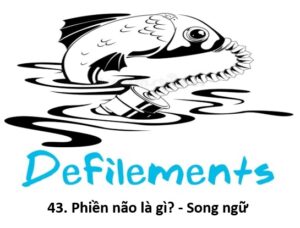
Defilements of life, can be explained in many ways, as the issues and challenges each of us deal with daily mostly due to our own dissatisfaction or disappointments towards the subjects each of us deal with. For the most part, the defilements exist due to our own causes. Yes, they are definitely related to everything that are of concern to us and because of that we are feeling the effects of the defilements.
Những phiền toái của cuộc đời, có thể được giải thích theo nhiều cách, vì những vấn đề và thách thức – mà mỗi chúng ta phải đối phó hàng ngày chủ yếu là do sự không hài lòng hoặc là thất vọng của chúng ta đối với các chủ đề mà mỗi chúng ta đối phó với. Phần lớn, các phiền não tồn tại là do nguyên nhân riêng lẻ của mỗi chúng ta. Vâng, chúng chắc chắn liên quan đến tất cả mọi thứ mà chúng ta đang quan tâm và bởi vì chúng ta đang cảm thấy bị ảnh hưởng của các phiền não.

For example, we all wanted to do better in our finances, by being a very frugal existence, avoiding all luxuries and save more in our savings account. Yet, we constantly find new, interesting things on sale that would be more entertaining – useful and truly serves what we wanted. We are now at, the fork in the road of decision, came upon us each time and the burden (consequences) of decision came along as well.
Ví dụ, tất cả chúng ta muốn làm tốt hơn về mặt tài chính của mình, bằng cách có cuộc sống thanh đạm, tránh mọi thứ xa xỉ, để tiết kiệm nhiều tiền hơn trong tài khoản tiết kiệm. Tuy nhiên, chúng ta liên tục tìm thấy những thứ mới, thú vị được bán rẻ mà sẽ có thêm giải trí – hữu ích, và thực sự phục vụ những gì chúng ta cần. Bây giờ chúng ta đang ở, ngã ba trên con đường của quyết định, đã đến với chúng ta mỗi lần và gánh nặng (hậu quả) của quyết định cũng đến.
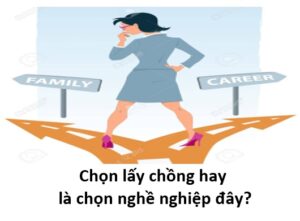
Much of the decision, originates in the circumstances of the moment, and you know – how our mind convince us (the body) to do that? If the goal to save more overshadows the wants of the things, then the credit card would be kept in the wallet – instead of being charged, and one more step towards the savings is becoming true. In reverse, charging of the credit card is the beginning of the road towards paying for the purchase and missing the goal to save more. Short term pleasure, overshadows the pain to pay, and not only missing the savings goal, but also, we likely would leave the pain (of paying) for later.
Phần lớn quyết định, bắt nguồn từ hoàn cảnh hiện tại, và bạn có biết – làm thế nào mà cái tâm trí của chúng ta thuyết phục chúng ta (cơ thể) để làm điều đó? Nếu mục tiêu tiết kiệm được nhiều hơn mong muốn của mọi thứ, sau đó thẻ tín dụng sẽ được giữ trong ví – thay vì “cà thẻ tín dụng”, và một bước nữa hướng tới việc tiết kiệm đang trở thành sự thật. Ngược lại, trả tiền bằng thẻ tín dụng là điểm bắt đầu của đường đi đến việc trả tiền mua hàng và thiếu mục tiêu để tiết kiệm nhiều hơn. Khoái cảm nhất thời, che dấu nỗi đau tiền phải trả, và chẳng những thiếu sót mục tiêu tiết kiệm, mà chúng ta còn, có thể sẽ để lại niềm đau (trả bills) cho sau này.
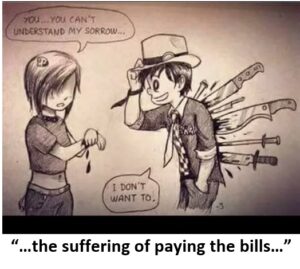
This is such a lame example, and it had little emotional effects – to dramatize the burden of the defilement. Often, we live thru life experiences of frustration and disturbances far beyond the above example.
Đây là một ví dụ tồi tệ, và nó có ít ảnh hưởng về cảm xúc – để truyền tải gánh nặng của sự phiền não. Thông thường, chúng ta sống qua trải nghiệm cuộc sống của sự thất vọng và rối loạn vượt ra khỏi ví dụ trên.
Imagine, one challenging issue that could cause sleepless nights or diverted focus from work that may threaten the viability of the job.
Hãy tưởng tượng, một vấn đề thách thức có thể gây ra những đêm không ngủ hoặc chuyển hướng tập trung từ công việc có thể đe doạ đến tính khả thi của công việc.
Now, we compound that with another one or two more similar issues, with diverse (alternative and different) challenges. The burden is now overbearing and possibly full to overflowing.
Bây giờ, chúng ta hãy kết hợp với một hoặc hai vấn đề tương tự khác, với những thách thức khác nhau (thay thế và khác nhau). Gánh nặng hiện nay đang quá đà chịu đựng và có thể tràn.
The disturbance is widespread, and could be causing harmful effects at work, in family, in relationships, or in friendship. Adding further, could be with an auto accident, or serious sickness, that is the heavy load – in which enough for anyone to begin to look for relief.
Sự xáo trộn đang lan rộng, và có thể gây ra những ảnh hưởng có hại trong công việc, gia đình, trong các mối quan hệ, hoặc trong tình bạn. Thêm hơn nữa, có thể
gây ra một tai nạn xe cộ, hoặc bệnh tật nghiêm trọng – đủ cho bất cứ ai để bắt đầu tìm sự trợ giúp.
In today’s society, defilements effect is altering life and could bring one into desperate – truly undesirable choices. This might be a horrible scenario to weigh, but not totally unlikely for each of us.
Trong xã hội ngày nay, phiền não có ảnh hưởng làm thay đổi cuộc sống và có thể đưa một vào tuyệt vọng – sự lựa chọn thực sự không mong muốn. Đây có thể là một viễn cảnh khủng khiếp để cân nhắc, nhưng không hoàn toàn không xảy ra cho mỗi người chúng ta.
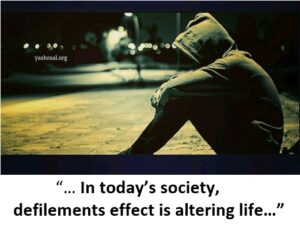
I am saying, defilements are normal everyday occurrences – that we must work with, and much of how well we fare in doing so, has much to do with the following few points:
Tôi đang nói rằng, những phiền toái là những sự kiện bình thường hàng ngày mà chúng ta phải làm việc, và phần lớn những gì chúng ta làm, khi làm như thế có liên quan đến những điểm sau đây:
– How well do we understand about ourselves? Particularly about our own thinking and actions. Do we rashly jump into decisions or we weigh decisions with potential outcomes before deciding? Do we understand the cause and effects of our thinking and decisions/actions? Do we need to gather sufficient information or research towards the most appropriate decision? Are we emotionally disturbed and could not calmly analyzing towards dealing with challenging issues that we must making difficult decisions?
– Chúng ta hiểu về bản thân của ta bao nhiêu? Đặc biệt về tư duy và hành động của chúng ta. Chúng ta có vượt qua những quyết định hay quyết định với những kết quả tiềm ẩn trước khi quyết định? Chúng ta có hiểu nguyên nhân và hậu quả của suy nghĩ và quyết định / hành động của chúng ta không? Chúng ta có cần thu thập đủ thông tin hoặc nghiên cứu hướng tới quyết định thích hợp nhất không? Chúng ta có bị xúc động về tinh thần và không thể bình tĩnh phân tích để giải quyết những vấn đề thách thức mà chúng ta phải đưa ra những quyết định khó khăn?.
– How positive or negative we tend to project ourselves into the possible solution when we face the issues? Do we see the situation as “half glass full or half glass empty”? How does this affect our decisions and outcome of our decisions?
– Dù tích cực hay tiêu cực chúng ta vẫn phải có những giải pháp khả thi khi chúng ta đối mặt với mọi vấn đề? Chúng ta có nhìn thấy tình hình là “một nửa ly đầy hoặc một nửa ly trống rỗng”? Điều này ảnh hưởng đến quyết định và kết quả của chúng ta như thế nào?
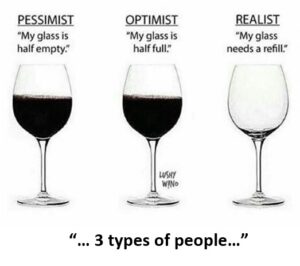
– Have we sought for help or advice from those who might have related or similar experiences?
– Chúng ta đã tìm kiếm sự giúp đỡ hoặc lời khuyên từ những người có thể có kinh nghiệm liên quan hoặc tương tự chưa?
– Successfulness for each of the issues – could mean less impactful, and return us back into our normal life balance – with minimal burden of defilements. In reverse, we could fall into a crushing defeat situation – with much pain that can only recover over time.
– Thành công cho từng vấn đề – có thể có nghĩa là ít tác động hơn, và đưa chúng ta trở lại với sự cân bằng của cuộc sống bình thường – với gánh nặng phiền não tối thiểu. Ngược lại, chúng ta có thể rơi vào tình trạng thất bại – với nhiều nỗi đau chỉ có thể hồi phục theo thời gian.
If I have scared you with the above, I apologize for being blunt. The thing is I wanted you to understand that each of us have our own defilements that we work with. It is important, to be able to know how best to deal with the effects, and being able to return to a balanced position. This way the effects of defilements would affect you the least.
Nếu tôi đã làm bạn hoảng sợ với những điều trên, tôi xin lỗi vì sự thẳng thắng. Điều tôi muốn bạn hiểu rằng mỗi người chúng ta đều có những phiền não riêng mà chúng ta phải đối đầu. Điều quan trọng, là biết để làm thế nào tốt nhất để đối phó với các hiệu ứng, và có thể trở lại một vị trí cân bằng. Bằng cách này ảnh hưởng của phiền não sẽ ảnh hưởng đến bạn ít nhất.

Let me tell you a story. Paul is a shopaholic, and he is heavily into electronic gadgetries. Paul is single and he was a recent graduate. He has a decent career and makes reasonable income. He rent his apartment and was dating Susie within the last year or so.
Hãy để tôi kể cho bạn một câu chuyện. Paul là một người mua sắm, và nhất là rất nhiều vào các thiết bị điện tử. Paul là một người độc thân, và anh ta đã tốt nghiệp gần đây. Anh ấy có một nghề nghiệp tốt và kiếm được thu nhập hợp lý. Anh ta thuê căn hộ của mình và hẹn hò với Susie trong vòng một năm trở lại đây.
Susie is getting close to graduate, and their relationship is getting more serious.
Recent discussion had brought up the need to save towards marriage, but Paul had no savings – since he had expensed all money – beyond essential – towards his electronic toys. Even though, Paul’s car is regularly breakdown, and Susie had to catch the bus several times, and missed a few of her classes.
Susie đang gần ngày tốt nghiệp, và mối quan hệ của họ đang trở nên trầm trọng hơn. Những cuộc thảo luận gần đây đã mang lại sự cần thiết phải cứu vãn hôn nhân, nhưng Paul không có tiền tiết kiệm – vì anh ta đã tiêu hết mọi khoản tiền – vượt ra ngoài – sự cần thiết đối với đồ chơi điện tử của mình. Ngay cả, chiếc xe của Paul thường xuyên bị hỏng, và Susie phải đi xe buýt vài lần, và bỏ lỡ vài lớp học của cô.
Paul and Susie continue to expense – into restaurant – even though Paul had no extra money to spend, and are often desperately waiting for the next pay check relief. Paul seemed wanting to cover up his electronic gadgetry spending by not telling Susie the situation and instead eating at home.
Paul và Susie tiếp tục xài tiền – vào nhà hàng – mặc dù Paul không có thêm tiền để chi tiêu, và thường liều lĩnh chờ đợi tiền lương tiếp theo giải ngân. Paul dường như muốn che giấu chi phí đồ điện tử của mình bằng cách không nói với Susie tình hình và thay vì ăn ở nhà.

A few months later, Paul had to further borrow from his credit card in order to pay for his rent and his finance condition is getting worse. Paul suffers headache and is concerned he cannot meet Susie’s expectation and disappoint her.
Vài tháng sau, Paul đã phải vay thêm từ thẻ tín dụng của mình để trả tiền nhà và tình trạng tài chính của anh trở nên tồi tệ hơn. Paul đau đầu và lo ngại anh ta không thể đáp ứng được kỳ vọng của Susie và làm cô thất vọng.
However, he continued to struggle between his precious electronic gadgetries, which many were bought with “monthly payments, and his rent each month. Both are waiting to be met (make bill payments) on each payday.
Tuy nhiên, anh ta vẫn tiếp tục cuộc đấu tranh giữa các thiết bị điện tử quý giá của mình, nhiều thứ đã phải mua với “nợ hàng tháng”, bên cạnh với tiền thuê nhà mỗi tháng nữa. Cả hai đều đang chờ đợi để được đáp ứng (trả bills) trong mỗi kỳ trả lương.
Susie’s graduation is coming up, and need a decent gift, and Paul is worried Susie will again bring up the saving – for marriage subject, while Paul is trapped in a money pit. Paul is frustrated and angry, that reflected the burden of the defilement that he should bear full responsibilities.
Ngày tốt nghiệp của Susie đang gần kề, và cần một món quà phong phú cho nàng, và Paul lo lắng Susie sẽ đem vấn đề tiết kiệm ra – lập lại cho chủ đề hôn nhân, trong khi Paul đang bị mắc kẹt trong hố tiền đã bị xài hết. Phao-lô thất vọng và tức giận, phản ảnh gánh nặng phiền não mà anh ta phải gánh vác hết trách nhiệm.
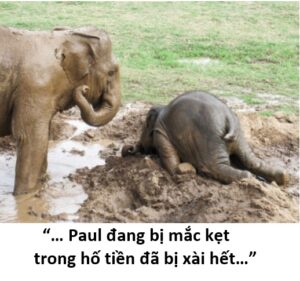
Let us analyze this situation and noting the following:
- Paul did not know his own financial condition, and he also did not know how to budget for his own good. He is also overly indulging his own electronic gadgetry pleasure, that not only places his own rent in trouble, but he could also ruin relationship with Susie.
Hãy để chúng ta phân tích tình huống này và lưu ý những điều sau:
- Phao-lô không biết tình trạng tài chánh của mình, và anh ta cũng không biết làm thế nào để dự thảo ngân sách có lợi cho mình. Anh ta cũng quá say mê thú vui điện tử của riêng mình, mà không chỉ tiền thuê gặp rắc rối, mà anh ta cũng có thể hủy hoại mối quan hệ với Susie.
Worse yet, he might even ruin his career, due to the same rooted issue. More so than anything else, Paul did not know what he “needed” verses, and what he “wanted”? Had he figured out earlier, and had absolute control over his hobby spending, he would be much better off with his rent, his social relationship, and even his career.
Tệ hơn nữa, anh thậm chí có thể hủy hoại sự nghiệp của mình, do cùng gốc rễ của một vấn đề. Hơn bất cứ điều gì khác, Paul không biết mình sự thật mình “cần” gì, và anh ta “muốn” gì?. Nếu anh ta đã biết trước, và kiểm soát tuyệt đối chi tiêu của mình, anh ta sẽ tốt hơn nhiều với tiền thuê nhà, mối quan hệ của anh ta, và thậm chí sự nghiệp của anh ta nữa.
- Paul should be honest with Susie, about the finance and his hobby spending. He should also be open to gain control to the hobby spending, and shift any extra fund towards savings towards marriage. The hobby sacrifice, would please Susie when she understood what he had done.
Paul nên thật thà khai báo với Susie về mặt tài chính và chi tiêu riêng của mình. Anh ta cũng nên cởi mở để giành quyền kiểm soát chi tiêu đối với sở thích riêng, và chuyển bất kỳ khoản tiền bổ sung nào sang quỷ tiết kiệm cho hôn nhân. Việc hy sinh sở thích riêng, sẽ làm cho Susie vui vẻ khi cô hiểu anh đã làm gì.

Our own defilements are largely created by ourselves. Not being honest to ourselves, about any addiction or drowning in hobbies, could present us with untimely financial, emotional or unpleasant relation challenges unintended.
Những phiền não của chúng ta phần lớn do chúng ta tạo ra. Không thành thật với bản thân, về bất kỳ sự say mê hoặc đắm chìm trong sở thích riêng, có thể cho chúng ta thấy những thách thức liên quan đến tài chính, tình cảm, hoặc khó chịu không mong muốn.
The important point of this example: is Paul should understand his own addiction into electronic gadgetries, and his shopaholic habit. Had Paul intended to avoid the effects of the defilement, he needed to work through his own self-understanding to start with and able to overcome his desire for the hobbies. He then could rein in his relationship while ensuring his career is not getting damaged.
Điểm quan trọng của ví dụ này là: Paul nên hiểu về sự nghiện của mình vào các thiết bị điện tử, và thói quen mua sắm của mình. Nếu Phaolô dự định tránh những ảnh hưởng của sự phiền não, anh ta cần phải làm việc thông qua sự hiểu biết của mình để bắt đầu, và có thể vượt qua được sự ham muốn của mình vào sở thích riêng. Sau đó anh ta có thể kiềm chế mối quan hệ của mình trong khi đảm bảo sự nghiệp của mình không bị thiệt hại.
So how could we control the effects of Defilement?
There are a few points to follow:
- Build a self-discovery habit, that enable us to know our own thinking and behavior, particularly in this case our needs verse our wants. Should understanding ourselves and our own motivations, those can help us to:
Vậy làm sao chúng ta có thể kiểm soát được ảnh hưởng của Phiền não?
Có một số điểm cần làm theo:
- Xây dựng một thói quen tự khám phá, cho phép chúng ta biết được suy nghĩ và hành vi của chúng ta, đặc biệt trong trường hợp này nhu cầu thực sự của chúng ta là những gì chúng ta muốn. Nên hiểu chính mình và động cơ thúc đẩy, điều đó mới thể giúp chúng ta được:
- Be a better (more passionate/compassionate) human being
- Live amongst others in society with less conflict and more harmony
- Be more responsible for our own thinking/behavior/action
- Become more positive in points of view, with consideration for more positive (less burdensome) outcome in various situation.
- Làm một con người tốt hơn (đầy nhiệt tình / từ bi) hơn
- Sống giữa những người khác trong xã hội ít xung đột và hòa hợp hơn
- Có trách nhiệm hơn với tư duy / hành vi / hành động của chúng ta
- Trở nên tích cực hơn trong quan điểm, với việc xem xét cho kết quả tích cực hơn (ít phiền toái hơn) trong các tình huống khác nhau.
- Live a more ethical and disciplined life.
Sống một cuộc sống đạo đức và kỷ luật hơn.
- Strive to achieve 1 & 2 above, in order to minimize the effects of defilements. In other description, we might even create less negative Karma. As a person who practice these points, before benefit of others, starting with the benefiting of one-self first.
Phấn đấu đạt được 1 & 2 ở trên, để giảm thiểu ảnh hưởng của phiền não. Trong các mô tả khác, thậm chí chúng ta có thể ít tạo ra ác nghiệp. Là một người thực hành những điểm này, trước khi đem lại lợi ích cho người khác, bắt đầu bằng việc mình sẽ hưởng lợi trước.
- Beyond your family, your neighbors, your friends, your coworkers, your city, state and country, you being a more conscious person would help the society/world be more peaceful.
Ngoài gia đình, hàng xóm của bạn, bạn bè, đồng nghiệp, thành phố, tiểu bang và đất nước của bạn, bạn là một người có ý thức hơn sẽ giúp xã hội / thế giới yên bình hơn.
Does that mean we could seek for happiness beyond defilements?
Yes, happiness is being able to shed the effects of defilements. Until you experience defilements, it will be difficult to know happiness.
Điều đó có nghĩa là chúng ta có thể tìm kiếm hạnh phúc ngoài những phiền não? Vâng, hạnh phúc đang có thể làm sáng tỏ những ảnh hưởng của phiền não. Cho đến khi bạn kinh nghiệm phiền não, sẽ rất khó để biết hạnh phúc.
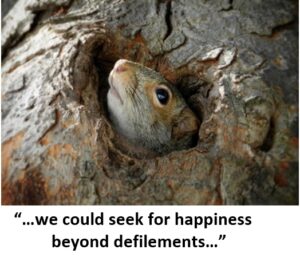
Note – Ghi Chú
By navigate the “Jungle of human ego” I am referring to the conflict of interest between one to all other human beings when interacting with each other. I wanted this way and others wanted differently. While the perspective differs, the purpose and interest differ as well. Often, what appears as a simple subject could suddenly grow complications resulting in unexpected defilement (disappointment) for oneself and numerous others as well.
Why jungle? Due to the numerous possible conflicts, some cases could be numerous as traversing the jungle. Why Ego? Human being lives for and build up their ego on every possible instance of subject they work with since they were young. Societal status, profession, location of residence, size of the home owned, type of car driven, spare money in pockets, fancy gadgets or even handsome/beautiful spouse are all sources of “ego building”. Over time, our ego establishes acceptable/unacceptable standard we grow accustom to and gaining ready reactions of preferences or dislike that result in each of us (human beings) act out in our behavior.
Humbleness is almost unnatural if one did not go through certain amount of life experiences that provided lessons for one to change for the better. Additionally, if there were lessons (such as learning Buddha’s teaching) that could permit us to reflect upon how we think/reflect and drives our behavior, then we might have a chance to reduce the possible defilement occurring to us mostly due to our inability to understand how we behaved and where the cause of defilement originated. Reducing the defilement from our societal life will ultimately enable us to see the light of happiness and maybe be on the road toward happiness with less defilements.
Sources:
Tài liệu tham khảo:
- https://www.pinterest.com/OmegaInstitute/the-omega-experience/
- https://www.pinterest.com/pin/331155378819750834/
- https://www.dreamstime.com/illustration/defilement.html
- https://issuu.com/awakenpublishing/docs/don_t_look_down_on_the_defilements_
